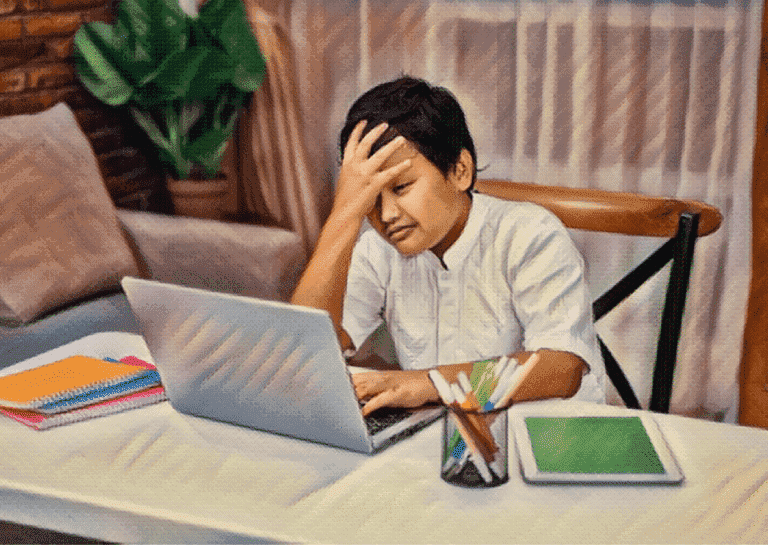With so many societal pressures to succeed, it’s stressful to be a kid today. It’s also stressful to be a parent raising kids today. In this quick tip episode, we talk about the qualities parents can instill in their kids to deal with pressure to help them succeed in a competitive environment.
Introduction
As exciting as going to school may be, there is anxiety that comes along with responsibilities. Children today are feeling extreme pressure to succeed, and their parents, peers, and society all play a role. Dr. Michele Borba asked kids what it’s like to be a kid today in focus groups. Many of the kids said they had no time for friends, hobbies, or time to just be a kid between all of their schoolwork, extracurricular activities, and social media. It’s a generation worried about meeting expectations and crafting the perfect image. Understandably, they’re lonely, stressed, and anxious.
Table of contents
Effects of Stress on Children
There are physical and mental side effects of Stress. According to the Center for Anxiety Disorders, when exposed to toxic stress, the risk of obesity, diabetes, heart disease, cancer, high blood pressure, and other disorders increases. Furthermore, they have a higher risk of depression, substance abuse and dependency, smoking, suicide, domestic violence, and risky behaviors. Stress can also increase headaches, decrease quality of sleep, and feeling a lack of control.
Taking Off the Pressure
Dr. Lynn Lyons, a clinical social worker, and psychotherapist says that the number one reason that parents bring children to speak to a mental health professional is anxiety. But the pressure doesn’t have to result in anxiety. A lot of these pressures come from school and performance among their peers. Parents can help students gain skills to manage realistic pressures without asking them for more than they can handle.
Dr. Borba says one thing parents can do to take away some of the pressure is to focus on character. She explains it like this: kids today exist today in a hyper-competitive environment that pits them against their peers and drives their want of recognition. There’s a constant push for more, which makes it difficult for kids to find where they fit in the world because they’re unintentionally being raised as products without being taught the very things that make us human. Things like coping with stress, working with others, facing mistakes, and problem-solving are not things they are learning in school.
How Parents Can Help Manage Pressure
Stress comes from many areas including performance in school, sports, extracurricular activities, and relationships. So, parents shouldn’t just be teaching their kids to pass tests and make good grades, they should be instilling qualities like empathy, perseverance, and self-confidence to help them navigate the real world.
We did a full book summary on the book “Thrivers: The Surprising Reasons Why Some Kids Struggle and Others Shine” By Michele Borba, which we will include in the show notes.
Pressures on Elementary School Children
Here are some things parents can do for children of different ages. For elementary school or grade school-aged kids, you can let them know that some uncertainty in life is okay. Parents often try to give them reassurance and information and tell them it will be okay when young children are under stress. However, according to Lyons, the pressure stems from a desire to know the conclusion which is part of human nature. It can be counterproductive to say “everything will be okay,” because that is not known for certainty. Instead, parents can help kids become comfortable with understanding that they don’t know what will happen next.
Pressures on Middle School Children
The most prominent pressure for middle school-aged children is social pressure. The best way parents can bring up conversations about social groups, rankings or status is by using a third person. Give a hypothetical or an anecdote about a friend’s daughter or son. This opens the conversation by making your child feel like it’s not about them, and therefore more likely to ask questions and give responses.
Pressures on High School Children
High school-aged kids feel the pressure in terms of their autonomy and perceived accomplishments. To help, parents can reiterate that there is more than one way to succeed at something. Lyons says that often, the pressure on high schoolers comes from their belief that there is only one path to success, and the decisions they make now are permanent. Parents can ease their pressure and stress by helping them see the big picture, that although their decisions might seem big right now, they aren’t all permanent. Students at this age are worried about how their behavior and performance now will affect them as an adult. Things are changeable, and in life being able to adapt is much more useful in the long run.
Relaxation for Stress
One way to help kids relieve stress is through exercise. Research in science has shown that exercise reduces feelings of stress and depression in children and adolescents and has a positive effect on the overall mindset and happiness. Another strategy to combat stress that parents can encourage children to do is mindfulness. It’s important for both adults and kids to take a break when they feel stressed. Making a habit of practicing gratitude can increase calmness, attitude, and confidence. We answered the question of how you can practice mindfulness with your family in one of our member Q&A episodes. You can also find the link to that episode in our show notes.

